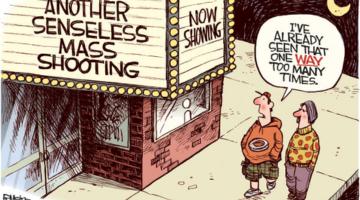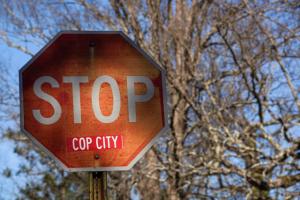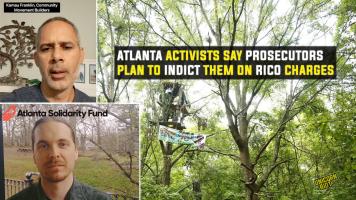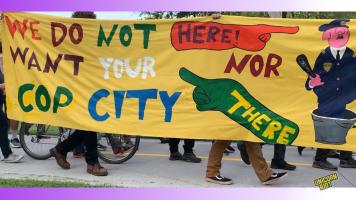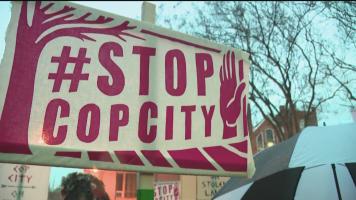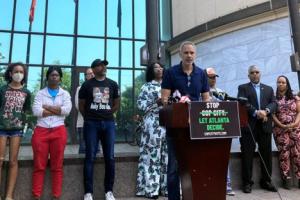The Atlanta Journal-Constitution never stopped printing racist lies—it just upgraded its fonts.
Originally published in Scalawag Magazine.
On Aug. 21, 2021, the editorial board of Atlanta Journal-Constitution (AJC) published its support for "Cop City"—a then-proposed $90 million training facility for police and fire personnel; the cost of which has since ballooned to over $109 million, according to the most recently available reports. The Atlanta City Council had tabled a vote on a lease agreement for the proposed Cop City facility just days earlier after receiving tremendous opposition from residents, activists, and environmentalists. In its letter, which ran in the legacy paper's Sunday edition, the editorial board—whose members included Kevin Riley, the paper's editor-in-chief—argued that a "crime wave" necessitated the facility's quick approval and pleaded with the city council to revisit the vote as early as its next meeting.
"It's safe to say that crime won't politely observe the delay," the board wrote. "Criminals will continue to ply their trade, exacting a cost in property, public fears and even lives." It urged the council to make haste and approve the proposal, concluding, "Moving forward on public safety requires no less."
However, the publication's manufacturing consent for a wider use of state force in response to a moral panic its publishing sensationalizes is not new. It is symptomatic of the AJC's long history of co-signing police terror and inciting racist vigilantism for the sake of maintaining "public order." In 1906, publishing by the AJC's predecessors—The Atlanta Journal and The Constitution—leveraged white fears of Black presence post-emancipation during a contentious gubernatorial race between the former's publisher Hoke Smith and the latter's editor Clark Howell, where Black political enfranchisement and prohibition were central political issues, sparked the Atlanta Race Massacre.
The Cop City site—approximately 381 acres of land in the Weelaunee Forest (also known as the South River Forest), originally inhabited by the Muscogee (Creek) Tribe and currently owned by the city—is located in a low-income, predominantly Black neighborhood in unincorporated DeKalb County. The site, once home to a plantation whose owner practiced chattel slavery, later held a federal prison until 1995, where incarcerated people, many of whom were Black, were forced to labor before the construction of Cop City, the Weelaunee forest was one of the largest remaining green spaces in the area, with a critical role in mitigating the impacts of climate change.
In September 2021, weeks after the AJC's editorial ran, Atlanta City Council ultimately passed the legislation it had initially tabled. The legislation authorized a lease of the land to the Atlanta Police Foundation, a 501c3 nonprofit organization that raises money for police operations, for $10 per year for 50 years—totaling to $500 for all 381 acres. The foundation, in turn, would oversee development of the facility, funding it through a public-private partnership, with public dollars responsible for one-third of the $90 million price tag. Since the legislation's passing, that public dollar amount has more than doubled, costing taxpayers $67 million, instead of the originally promised $30 million.
As the proposal for Cop City took shape, numerous community and environmental organizations warned that developing the site would reduce the tree canopy and the forest's natural carbon capture and make nearby areas more susceptible to flooding, among other issues. Locals also claimed that increased policing in the area would lead to heightened surveillance, increased state repression, and even death—all premonitions that have come true, notably with the violent police killing of Tortuguita on public land in Weelaunee's People Park on Jan. 18, 2023. Today, Lakewood residents continue to report increased surveillance and police harassment, even citing mysterious new surveillance cameras near their homes. In August 2023, local environmental nonprofit organization South River Watershed Alliance filed a lawsuit against the city and APF for violating the Clean Water Act through its construction of the facility. The lawsuit was settled last November; details haven't been revealed to the public.
In its August 2021 letter, the editorial board spent little time on the project's potential environmental or community-specific impacts. Instead, it limited its concerns for public well-being to the matter of increasing police resources.
"It's no exaggeration to say that better-trained officers may well save lives during routine encounters with the public," the board wrote. "That point alone should provide a catalyst for supporting the city's efforts to build the new training site."
The board provided no evidence to support that point, though—a glaring absence at a time when many journalistic efforts have provided sufficient data on fatal encounters with police to challenge it. Nor did it raise Atlanta's 75 of Georgia's 97 officer-involved shootings flagged that same year by the Georgia Bureau of Investigation, 42 of which resulted in civilian deaths, or the projected two-year timeline for building the facility—a timeline that challenged and contradicted the urgency of the editorial. Further, its claim of crime rate increases in Atlanta is also sensationalized: while homicide numbers spiked in 2020 amid the onset of a global pandemic, there was an overall documented decrease in crime between 2016 and 2021, the year the editorial was published. Moreover, many cities experienced increases in homicide rates during the first year of the coronavirus pandemic, pointing to other causal factors that have nothing to do with scarcity in police spending.
Additionally, the original publication carries an extremely noteworthy disclosure, sandwiched mid-way through the article, rather than the very top near the headline: "Cox Enterprises President and CEO Alex Taylor, who also chairs the Atlanta Committee for Progress, is leading a campaign to raise private funds for the project. Cox Enterprises owns The Atlanta Journal-Constitution." The article failed, however, to fully capture all of the paper's connections with the APF, in forgetting to mention that Cox Enterprises is also a top funder of the Atlanta Police Foundation as well as the sponsor of the foundation's annual "Crime is Toast" fundraiser event that same year. The Atlanta Committee for Progress is a majority-CEO group that vowed to "help fight crime in the city" earlier in 2021.
The editorial ran in that week's Sunday paper, along with two related op-eds. One, from APF board chairman Robert Loudermilk, Jr., called the proposed location "the only affordable, viable, and practical site," which was stated without any factual support or research. The op-ed also touted a slew of other claims without historical context or investigative research to back them up, including the financial promise of the facility costing only $30 million, which proved to be untrue. It also sported one of APF's favorite pieces of disinformation: that it would plant 100 hardwood trees for every single hardwood displaced by the development. Environmental researchers told Mainline in 2021 that this was physically impossible. The article also boasted the great, sensational lie that crime rates were spiking in Atlanta.
The other op-ed, from Councilmember Natalyn Archibong, urged the city council to learn from "the failed public engagement executed by APF" and provide "a well-executed and genuine public engagement process." The APF's "public engagement" included two virtual so-called "public input" sessions that July, both of which I was present for. During these sessions, constituents' microphones were muted and the chat was disabled. APF representatives answered questions previously submitted by the session's administrators, who were not identifiable in the meeting; neither constituents nor press were allowed to ask follow-up questions or challenge foundation representatives' responses.
City councilors and APF officials also referred to an "advisory council" whose members were meant to include "community members," but exclusively comprised officials from the city government, police and fire departments, and the APF. The AJC published notice of the input sessions, but did virtually nothing to challenge the ways in which they limited civic engagement; nor did it report on, and much less question, the make-up of the "advisory councils."
The public, in the face of the obstacles, made numerous efforts to engage. Following the council's tabled vote, an Atlanta-based research firm conducted its own survey of nearly 400 local residents, more than half of whom live in the zip codes immediately surrounding the planned development. Nearly all of the respondents opposed the construction of a police facility in the Old Atlanta Prison Farm area, with 90 percent opposed to the construction of any such facility anywhere in the city. The council, which had planned to take up the proposal again on Sept. 7, 2021, ultimately delayed its vote by a day in order to accommodate a surge of over 17 hours of public comments—more than 1,100 statements, the vast majority of which opposed the facility. Nevertheless, on September 8, council passed the proposal. Archibong, one of the four council members to vote against the facility, later told King Williams, a local independent journalist, that conflating public safety with the new training facility—which is precisely what the AJC had done in its editorial—was "a false narrative."
Mass mobilization efforts against Cop City continued well into 2023. That June, over 1,000 Atlantans protested in City Hall to oppose the increased budget plan for the facility during the #SendItBack protest, following another major City Hall protest a month prior. After the city council pushed the increased budget proposal through, organizers announced the historic referendum campaign—the first of its kind in Atlanta history—in an attempt to restore democracy by letting the people decide whether or not Cop City should exist. Organizers turned in over 108,000 petition signatures, which the city clerk refused to count, claiming they were submitted past the legal deadline. Today, the referendum remains caught up in appellate courts to determine whether or not the 60-day timeline applies to a superior judge's decision to allow DeKalb County residents to collect signatures.
Meanwhile, Cop City has been built, and its development stakeholders celebrated its private grand opening ceremony on April 29, 2025.
LOOKING BACK: THE AJC'S LONG LEGACY OF HARM
The Atlanta Journal-Constitution has a long legacy of circulating pro-police and corporate talking points, which, in the past, have directly led to violent police or mob killings in the city. Before the paper's merger, which was finalized in 2001, the city had two daily papers: The Journal and The Constitution. In 1906, The Constitution stoked panic among white communities by running sensationalized and false stories of Black men raping white women—the Big Lie inciting many race riots across the Southeast in the post-Reconstruction era. That September, the city was overrun by violent white mobs of up to 5,000 people, colluding with Fulton County police officers to brutalize and murder Black citizens.
Although the City of Atlanta did not publicly acknowledge the 1906 Race Riots, also known as the Atlanta Race Massacre, until 100 years after its occurrence—with at least one AJC reporter even passively acknowledging the newspapers' role—archived clippings from The Journal and The Constitution and documenters like Rebecca Burns, author of Rage in the Gate City, have enabled us to see the whole picture.
The race riots lasted for three days that September. Over 90 Black people were injured and more than 25 killed; 10 white people were injured and two killed. Leading up to the riots, The Constitution ran a daily column featuring conservative voices that demanded police and greater authorities act to save their white women and other property. Moreover, local papers, including both The Journal and The Constitution, also published numerous articles regularly calling for more policing in or the complete destruction of "negro dives," referring to bars where Black residents gathered to enjoy drink and food. These establishments were criminalized by the voice of the press, with the papers using the words "crime," "criminal," and "negro," practically interchangably—not dissimilar to how activities such as street racing, selling water during the summer, protest, and other activities continue to be demonized by local conservatives and the press that coddles their voices.
In 1906, a group of Black men shot at a car, causing no injuries. This was declared "one of the worst incidents of [the] night's horror," while at the same time, Black people were maimed in the streets. Articles highlighted property damage over the languishing of Black lives. In the midst of all the chaos and bloodshed, coverage continued to criminalize "negro dives" while calling for more surveilling and overpolicing of Black communities. Police murders of Black residents were commended as police were portrayed as heroes and the state militia as the city's saviors. Letters from politicians and the wealthy elite called on more police to protect women and children and to police the dives that "create" crime. These narrative accounts of the massacre justified white violence while faulting the marginalized, claiming that Black people caused the madness that engulfed the city.
After the violence of the 1906 riots dissipated, Black people who weren't murdered were detained, fined, and incarcerated—many for practicing the Second Amendment right of owning firearms. The city remained occupied by state and local law enforcement, as fleets of police were hired and put on the streets. Black men who were falsely accused and charged with raping white women before the riots were convicted and incarcerated. Everyday activities in Black communities were criminalized. But there was one event that has been particularly formidable for the City of Atlanta, a turning point from which its governance, both in politics and the press, has never looked back. As national guardsmen patrolled the city, a thousand "law-abiding" Atlanta citizens gathered together in the Chamber of Commerce superior court room. It was perhaps their conversations and resolutions—including the establishment of the city's heralded biracial elite governance coalition—that imprinted the city with a dynamic that shows up time and time again: the incestuous relationship between the white corporate class, Black elite leadership, the police, the city government, and daily papers, which would later merge to become The Atlanta Journal-Constitution—or what is more commonly referred to as "The Atlanta Way."
A section published in the Sept. 26, 1906, edition of the paper reads like the early makings of establishments like the Atlanta Committee for Progress: elitists joining together to uphold law and order in the city. In that courtroom, reportedly "practically every big business house and factory in the city was represented, as were the financial institutions, and the churches … men from every walk of life were there to do their part in guaranteeing law and order in Atlanta from this time on. Capitalists and laboring men, manufacturers, merchants, and ministers all stood together resolved to make a determined fight for the restoration of peace." Work was the prescribed antidote to prevent anything like the riots from happening again. "Keep the white and colored hard at work and they'll have no time to stand around the street corners," said renowned evangelical celebrity Sam Jones, who was regularly featured in the paper.
The "false narrative," as described by Archibong, was most exemplified and elevated in the AJC's 2021 "Voices Against Violence" section, which launched that summer and essentially operated as a pro-police platform. Reminiscent of the columns that ran during the race riots, the section almost exclusively featured pro-police editorials by former police chiefs, politicians, foundation heads, business CEOs, or well-known conservatives.
Every thread from the AJC's coverage preceding, during, and following the 1906 race riots carries into the present day—paving a direct path to Cop City. In 2020, the AJC's coverage of Atlanta's George Floyd solidarity uprising and Rayshard Brook's murder by APD officers is a perfect example of its pro-police bias. The exaggerated coverage of the burning of the Wendy's where Brooks was killed focused on capturing the arsonists, not the people's outrage. This, along with the paper's declaration that the police officers' clearance of any accountability for killing Brooks was "reasonable," demonstrates the paper's insistence on racialization and fetishization of property damage and looting, outweighing the severity of civilian deaths at the hands of police in its reporting.
The Wendy's protest coverage fits into a larger trend of pro-police sensationalized crime reporting, including: Riley's editorial letter openly debating Brooks' worth as a human being, calls from politicians for more police to protect families and property and opinion pieces from GOP voices and former police chiefs claiming crime in the city is out of control. The reports worked to frame pro-police stances as "centrist" and defund police rhetoric as "radical" or anti-democratic. An editorial from the AJC's president and publisher claimed that "the only hope" is more militarized police while slamming local organizers as "violent extremists." Opinion columnist Bill Torpy notably events as he constantly argued that the time is now for more police.
The disclosure of AJC's connection to Cop City and the APF is only sporadically mentioned throughout the paper's onslaught of coverage of the issue. The fear stoking, coupled with questionable and insufficient evidence, not only manufactures crime panics, but also consent for an expanded policing apparatus, with Cop City as its flagship institution. And now, this is the case not only in Atlanta, but across the country.
Aja Arnold is an independent journalist based in Atlanta, Ga., and is co-founder of the Atlanta-based abolitionist media outlet Mainline.



